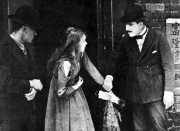Is It Really a Great Movie? Part Ten: Broken Blossoms
by dan heaton
Using Roger Ebert's Great Movies book as a guide, this series of articles will focus on all films included on his list that previously have escaped my notice. Since all lists are subjective, I am not treating Ebert's choices as the essential selection of films. However, his essays offer the perfect chance for me to explore both classics and lesser-known pictures from around the globe.

Prolific filmmaker D.W. Griffith is well-known for 1915’s Birth of a Nation, a Civil War epic that featured impressive direction but presented shocking racist attitudes. While he strongly denied the harsh criticism, the bigoted images are impossible to defend. In 1919, Griffith aimed to offer a fairer depiction of other races with Broken Blossoms – the story of Cheng Huan’s (titled as “The Yellow Man”) attempts to bring Buddhism to England. This melodrama is one of Ebert’s most baffling choices for the Great Movies designation. It was recognized for preservation by the National Film Registry in 1996, but contains few notable elements that would warrant such high recognition from Ebert.
Based on the sadly titled Thomas Burke short story The Chink and the Child, the film begins in China, where the Yellow Man observes some ungainly behavior from English sailors. Feeling strongly about Buddhism, he decides to undertake a risky journey overseas to present his peaceful ideas. Unfortunately, he fails completely as a missionary and ends up working as a shopkeeper. He also spends considerable time at Opium parlors, which seems like odd behavior for a religious man. The story’s other major character is 15-year-old Lucy (Lilian Gish), who lives with her abusive father Battling Burrows (Donald Crisp). He works as a boxer and feels no qualms about brutally whipping his daughter for even a minor offense. Crisp is so over the top as Burrows that he loses all effectiveness and becomes a dull character. His actions are horrifying, but the crazed antics greatly lessen the performance’s effectiveness.
In my previous review for Sweet Smell of Success, I discussed my hopes for breaking any personal stigmas about older films during this series. That picture remains sharp and relevant today, but I cannot make the same claim about Broken Blossoms. This film is nearly 90 years old, and that age should definitely play a role in my response. However, this overacted melodrama just doesn’t work even when you consider the different social conventions. It is difficult to ignore terms like “Chink” and “The Yellow Man,” but I might have understood their inclusion within the confines of an interesting film. Instead, the racist attitudes only increase the story’s unfortunate nature. I realize that silent films require the characters to play their roles bigger, but Gish and Crisp are so far beyond subtle that it becomes nearly ridiculous.
Another major problem is that The Yellow Man is portrayed by the Caucasian Richard Barthelmess, who has been made up to look Chinese. The actor gives a good effort, but his mannerisms recall bad Asian clichés and lessen our interest. The pivotal scene involves a meeting between Lucy and The Yellow Man while she hides from her father’s wrath. A brief moment appears to offer chances for romance, but that possibility cannot exist in this film era. This conflict between social conventions and the character’s feelings would have created an interesting story, but the moment is too brief. Instead, we witness long takes of Gish acting crazy and Barthelmess doing virtually nothing. My annoyance with everything could relate to the melodrama genre as a whole, but I usually can tolerate much more when the emotions are less blatant.
Roger Ebert acknowledges Broken Blossoms’ dated aspects, but praises Gish and states that the movie “helped nudge a xenophobic nation toward racial tolerance.” While I understand that it depicted a possible inter-racial romance and was slightly groundbreaking, this fact is not enough to deserve status as a Great Movie. I also disagree about Gish, who may have screen presence but overdoes her character’s suffering. The tragic outcome is stunning, but it would have been even stronger if her character had been more believable. Viewing this type of film is interesting because it showcases the considerable progress society has made since 1919. However, it still presents some serious flaws in Griffith’s worldview and filming style that are difficult to ignore. His views might have been progressive at the time, but they still induces cringes and don’t save an already tedious picture.
Copyright (c) 2007 erasing clouds |
|